 MyCatBreeds
MyCatBreeds European Shorthair is originated from Sweden but Devon Rex is originated from United Kingdom. Both European Shorthair and Devon Rex are having almost same weight. European Shorthair may live 5 years more than Devon Rex. Both European Shorthair and Devon Rex has same litter size. Both European Shorthair and Devon Rex requires Low maintenance.
European Shorthair is originated from Sweden but Devon Rex is originated from United Kingdom. Both European Shorthair and Devon Rex are having almost same weight. European Shorthair may live 5 years more than Devon Rex. Both European Shorthair and Devon Rex has same litter size. Both European Shorthair and Devon Rex requires Low maintenance.
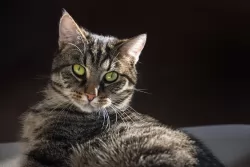 The European Shorthair is a cat breed that hails from Sweden but it also has roots that go back to the Roman Empire.
The European Shorthair is a cat breed that hails from Sweden but it also has roots that go back to the Roman Empire.
It is referred to as a natural cat breed, which means that the cat came about naturally without any human intervention.
The cat has had great hunting skills and this has what has made it sought after as a cat to keep rodents at bay. It became a famous housecat as well.
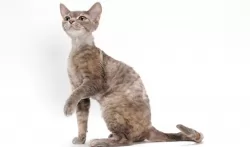 The Devon Rex is a cat known for its large ears and its curly, soft coat. It hails from England, emerging in the 1950s.
The Devon Rex is a cat known for its large ears and its curly, soft coat. It hails from England, emerging in the 1950s.
The cat is recognized by quite a few cat associations. The first of these cats was discovered by Beryl Cox in 1959 in Buckfastleigh, Devon. When the cat started appearing in cat shows in the UK, people starting becoming interested in owning these unusual cats.
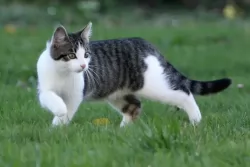 These domestic cats of Europe are a medium- to large-sized cat, weighing between 4 and 6kg, though some can be heavier.
These domestic cats of Europe are a medium- to large-sized cat, weighing between 4 and 6kg, though some can be heavier.
The European Shorthair has a fairly large head and medium-sized ears. The body is robust and round shaped. The cat’s short coat without an undercoat comes in a range of colors and patterns such as white, cream, red, black and blue with eyes that are green, yellow, brown or copper or blue.
The European Shorthair is known for its adaptable nature and the cat is able to fit into different lifestyles with ease. It's a cat that will live happily with children, pets, adults and seniors.
The cat loves his human family and loves becoming involved with fun games and activities. It's an intelligent cat too and cat food puzzles help him to think about how to get his food.
Even though your cat is social with his human family, it becomes fairly shy and nervous of strangers.
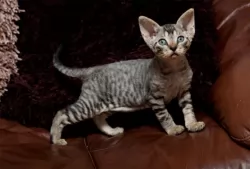 Known for its slender, light build, and weighing roughly between 2 and 4kg, the medium-sized Devon Rex has large, rounded ears. It is the large, rounded ears, set low on the sides of the broad head that make it slightly gremlin-like in appearance.
Known for its slender, light build, and weighing roughly between 2 and 4kg, the medium-sized Devon Rex has large, rounded ears. It is the large, rounded ears, set low on the sides of the broad head that make it slightly gremlin-like in appearance.
Their eyes are also large, and their noses are slightly upturned. It’s short, curly coat is another unusual feature and comes in many colors and patterns. The eyes can be blue, yellow, copper or he can be odd-eyed.
Your Devon Rex is quite a naughty cat, enjoying getting up to all kinds of mischief. Energetic, they love leaping up high onto perches so you’ll often find your Devon Rex in odd spots, more so if it's a spot in the sun as he loves warmth. It is why it is important to buy a cat tree for this cat.
It’s a loving, loyal cat and it will attach itself to one member of the family and then they are capable of pouring out the love and affection on this particular person. They’re also playful cats, as well as being intelligent.
He can learn a few tricks and can also be trained to walk on a leash. This is an active, energetic breed and will provide his human family with hours of amusing entertainment.
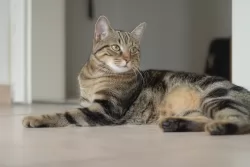 The European Shorthair is such a sweet cat and he is able to adapt fairly easily to new environments. It is such an ideal cat for households with singles, couples, families, and seniors as it adapts its personality to suit, getting on well with other pets as well.
The European Shorthair is such a sweet cat and he is able to adapt fairly easily to new environments. It is such an ideal cat for households with singles, couples, families, and seniors as it adapts its personality to suit, getting on well with other pets as well.
The cat loves his human family and wants to please, but loves to play too, being active and playful. Having one of these cats in your home is like bringing in a treasured gem.
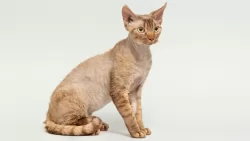 Your Devon Rex is a social cat and is happy to be found on your lap. He doesn’t take kindly to being left on his own though. He isn’t a suitable fit for someone who works all day.
Your Devon Rex is a social cat and is happy to be found on your lap. He doesn’t take kindly to being left on his own though. He isn’t a suitable fit for someone who works all day.
If you love animals, then maybe another companion animal would be a good idea as he is an amicable cat and gets on well with other animals.
When you spend time with your cat, make sure it is a special time, full of treats and stimulating play as he will learn to even fetch a small ball.
Just give him lots of attention and he’ll be your provider of companionship and entertainment.
 Even if your European Shorthair appears to be well, it is a good idea to get used to taking your cat to the vet for an annual check-up.
Even if your European Shorthair appears to be well, it is a good idea to get used to taking your cat to the vet for an annual check-up.
To provide your cat with the best chance to remain healthy, good diet and exercise is imperative. Look out for an itchy skin too as this could well be a sign that your cat is being plagued by parasites. Parasites can be a terrible problem and it will need to be attended to by your vet.
Parasites and an itchy skin can be a nightmare for your pet and make him most miserable with excessive scratching and licking as well as thinning of hair.
A new kitten will also require being vaccinated to ensure he remains healthy. These injections protect your cat from life-threatening diseases. Usually, vets start vaccines at between 8 – 12 weeks of age to protect your cat against the likes of Feline Leukaemia Virus, Feline Infectious Enteritis and Cat Flu.
There are also other vaccinations you might want to consider such as rabies and chlamydia.
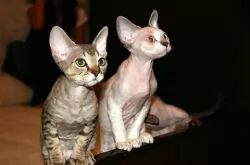 This particular cat isn’t known for any extreme health issues but even so, there are some health problems that are important to know about -
This particular cat isn’t known for any extreme health issues but even so, there are some health problems that are important to know about -
This is where the patella or knee cap moves out of its usual spot. It can occur because of a number of reasons such as an injury or congenital malformation. The vet will want x-rays because sometimes hip dysplasia is also present.
This is an inherited condition seen in both male and female cats and usually in young kittens. The cat has an odd gait with a head that bobs along as is tries to walk. The cat has tremors and also has difficulty with swallowing. With a visit to the vet and special care, your cat can do well.
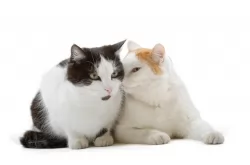 European Shorthairs like to groom themselves, but even so, you want to brush your cat once a week to keep the hair shiny and healthy. Make sure to trim your cat’s claws at the same time. It’s your time to feel for any unusual lumps or scratches on your feline friend’s skin. Check his eyes and make sure they are still bright and clear, look inside the ears to make sure they aren’t becoming clogged with dirt and wax and look inside the mouth to ensure no signs of gum- and tooth disease.
European Shorthairs like to groom themselves, but even so, you want to brush your cat once a week to keep the hair shiny and healthy. Make sure to trim your cat’s claws at the same time. It’s your time to feel for any unusual lumps or scratches on your feline friend’s skin. Check his eyes and make sure they are still bright and clear, look inside the ears to make sure they aren’t becoming clogged with dirt and wax and look inside the mouth to ensure no signs of gum- and tooth disease.
Your cat may well be outgoing with his human family, but his nervousness with strangers will require you providing him with a safe haven of his own. This might be his own bed which should be in a safe, dry, quiet area where he can retreat and feel more secure.
European Shorthairs love being outdoors and particularly if you have a female you’ll want her spayed to avoid her becoming pregnant. Cat shelters are already full of unwanted kittens and you don’t want to add to the burden. Also, have your male neutered too as he is ar less likely to want to roam. Spaying and neutering come with many health benefits too.
Be very careful of your cat’s diet. This is because the domestic cat is a carnivore and still essentially a predator, liking to hunt for their meat. They require a meat diet. However, cats have special dietary requirements and they require a balanced diet. All cats are individuals and they have different food likes and preferences, but they all need the best food there is to remain in peak condition. If you feed your cat commercially manufactured food, always follow the instructions on the label.
Provide your feline pet with cat accessories – food and water bowl, collar and tag, soft bedding, a climbing tree, scratching post, litter box, grooming accessories and toys.
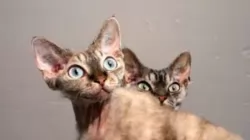 The Devon rex cat breed is known for its unusual looks with its wavy fur, large ears and large eyes. It is considered a rare breed and you want to make sure that you take proper care of him.
The Devon rex cat breed is known for its unusual looks with its wavy fur, large ears and large eyes. It is considered a rare breed and you want to make sure that you take proper care of him.
Owners of the Devon Rex know that these cats love their food and it has to be top quality food to enhance good feline health.
Cats are carnivores, ad this actually means that they should stick to a meat diet. Any food you buy your cat should be mainly meat. Look at the packaging of the commercially manufactured cat foods you want to buy, and make sure that the first few ingredients are some sort of meat.
Remember that any uncertainty with feeding your cat, you can chat with your vet.
Keep the inside of your cat’s ear free of an accumulation of wax and dirt as well as infection. If you don’t like the idea of probing in your cat’s ears, be in contact with your vet or a reputable, professional cat groomer.
Trim the cat’s nails.
Check inside his mouth for bad teeth as this could be causing him pain.
Clean your cat’s litter box every single day and also replace the grit regularly.
Get your cat veterinary care as soon as he shows signs of illness. Certainly, make sure all his vaccines and deworming are up to date.